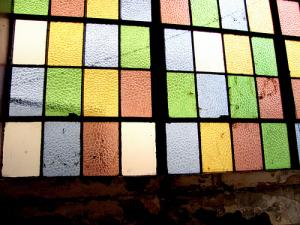The point I heard over and over again prior to a tour of the new Crocodile was that it is not a cleaned up version of the Crocodile Café, the legendary rock club that had been at the corner of Second and Blanchard in Belltown from 1991 to its abrupt closing in December of 2007.
Going in, I thought I understood what that meant.
“You’re mind is being blown, isn’t it?” the Crocodile’s PR specialist Kerri Harrop asked me and she was correct. I tried to piece together what the club would look like from my memory of the prior location and the few glimpses I caught from the peaking through doors open as I would walk past it on my way to or from my Belltown apartment. Aside from a few artifacts held over (a few coolers, the infamous pole – which was moved to a non-intrusive spot near the stage), only the Crocodile name and the address are the same.
When I began my tour on Tuesday evening with Harrop and booking agent Eli Anderson, it looked as if the club was almost ready to be opened, maybe two weeks away. The Crocodile would open a little over forty-eight hours from the time Harrop and Anderson would welcome me and photographer Jeanine Anderson into the club. At the time of our tour, the liquor license hadn’t even been secured. Despite the obvious crunch time in getting the club ready for its grand opening, neither could have possibly been more accommodating or generous with their time.
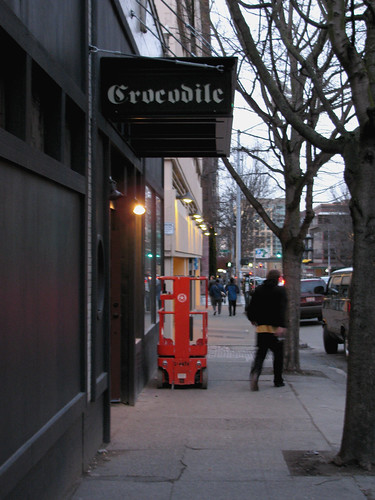
When you enter the through Second Avenue, the first thing you should notice is the bar. It is long bar with four wells. In the Crocodile we remember fondly, the bar was in the very back of the club and it made it nearly impossible to get a drink without missing show. In the Crocodile 2.0, the bar is facing the stage. It’ll be managed by Jon Compton, who is also the bar manager of Juju, which is on the same block and is also owned by the Croc’s primary owner, Marcus Charles (I’ve also been a semi-regular customer at Juju for most of 2009).
As I mentioned above, the stage and bar are at opposite ends of the room. If there is any geographic difference between where the sound booth is from its previous location, the difference is minimal. The sound system, though, is brand new. Anderson told me that the Croc’s legendary sound man, Jim Anderson (no relation, at least to my knowledge), will be the primary sound guy at the Crocodile, although his old system is now housed at Chop Suey.
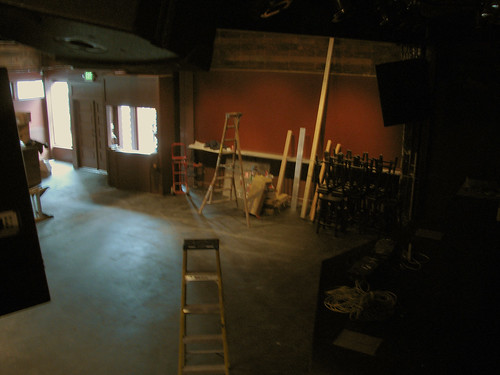
The lighting system is also first rate. Eli Anderson told me that he remembered seeing the English rock band Spiritualized play in New York and being blown away by their stage show but it couldn’t be replicated when he saw them play later at Neumo’s. A point that Anderson and Harrop both made repeatedly was that putting the club together was a collaborative effort. Anderson gave as an example that he and entertainment director Roy Atizado recommended against a previous idea for the bar’s location. He also said the design of the club was to move from bigger to smaller (and vice versa) bands with relative ease.
I asked Anderson for a ballpark figure for how much money was pumped into the club and he just said “a lot”.
Where the bar was in your memory of the Crocodile is now a Via Tribunali restaurant. It will be open regular business hours and have tables separate from the club, but there is also a window that you can order pizza during a show. It’s adjacent to the stage. I asked Harrop if the restaurant and club were separate entities and she said she considered it more of a multi-purpose room.
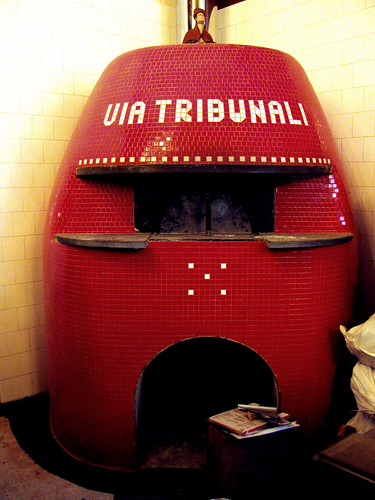
When the doors open on Thursday evening, the bill will be The Quiet Ones, The Kindness Kind and Hypatia Lake and they are going to be free and open to the public. To answer a trivia question, The Posies were the first band to headline a show at the Crocodile Café in 1991. I commented to her that I really liked that idea because it automatically welcomed everyone into the club. A private event with VIPs that featured some huge star like Eddie Vedder would cause resentment for the people who weren’t invited. That was the consensus amongst the staff I talked to.
When the Crocodile closed in 2007 it was a surprise, but maybe it shouldn’t have been. Like with current economic crisis, warning signs were visible, although most didn’t notice until looking in hindsight. When talent booker (and, full disclosure, my friend) Pete Greenberg quit earlier in the year, his resignation (and obvious frustration with the previous owner) made its way on to Line Out, The Stranger’s music blog. Here, Charles, Anderson and the rest of the Crocodile staff are determined not to repeat the mistakes made in the past. The Crocodile Café was generally open Tuesday through Saturday, and generally closed on Sundays and Mondays. I asked Anderson if they were following a set schedule and he said they were focusing on booking quality events primarily and wasn’t going to follow a rigid schedule and the club would not open for nights where a high interest event couldn’t be found. Harrop did tell me later, though, that the club is working with promoter Marcus Lalario–partner at The Council and co-owner of the War Room and most well-known for founding the popular hip hop night “Yo Son!” that had successful runs at Chop Suey, Neumo’s and the War Room to develop a regular, Sunday club night. The as-of-yet-unnamed night is set to debut in May.
Anderson and Atizado have put together a schedule is especially impressive, with touring artists like Dr. Dog, Bat for Lashes and The Ting Tings (the latter had sold out within a few hours) scheduling their tour stops at the Croc. Talking with Anderson in his office about booking, we discussed the partnership with the Doug Fir Lounge in Portland and said it is to be mutually beneficial. Although the Doug Fir is assisting with some booking of the Crocodile, it’s mostly to help build it a relationship between the two clubs and assist artists in growing their audiences in the northwest. Yet, Anderson was most excited about the local artists he’s booked, especially with the March 27 show with The Builders and the Butchers and Kay Kay and His Weathered Underground as well as the April 17 show with favorites Throw Me the Statue, Say Hi and Telekinesis. He also said that Jim Anderson will be working sound mostly on nights with local musicians.
Spending time with both Anderson and Harrop, they spoke about being part of a community, in different ways. Anderson wanted to nurture promising local bands and give them a club with first-rate acoustics to play in. Harrop talked about how she didn’t believe that “for one club to open, another had to close”. Although she probably wouldn’t approve of this metaphor (and it is imperfect), it is like how Starbucks actually benefits smaller coffee shops when they move into areas because they increase the number of coffee drinkers significantly. The Crocodile reopening does not mean that for every person they bring in through the door, there is one person not going to the High Dive or the Sunset or the Comet. Booking will become more competitive between clubs, sure, but the interest in the Crocodile should increase the interest in northwest artists and in Seattle music in general. A better example might be the change at the club Nectar. Prior to hiring booker Colin Johnson (who has since moved to Los Angeles), it catered to a distinct crowd: Fremont hippies. Nectar changed their focus from booking jam or reggae bands to landing top touring acts and becoming a welcome home for northwest hip hop. No clubs went out of business due to Nectar’s growth, only the bookers from other clubs had to work a little bit harder to stay competitive.
Nearly every day I’m reminded fondly of a memory from the Crocodile Café. About a month ago I saw a friend at Chop Suey who I see infrequently and she showed me her engagement ring and we talked about the Imperial Teen show at the Croc where she was trying to find the confidence to say hi to the gentleman that would become her fiancé. Or last week I was e-mailing with Pete Doherty’s (now Peter) US publicist about writing about his upcoming solo record (and I probably will) and I asked, jokingly, if he had plans for a US tour and I started to think of the intensity from when I saw him with The Libertines in the early 2000s. He kept pushing himself beyond what you thought could be possible; if the amps in Spinal Tap went to eleven, his went to fourteen.
From spending a little over an hour in the new Crocodile on the Tuesday before their Thursday night opening, it’s obvious that the only similarity between the “old” and “new” Crocodiles is that you’ll still be seeing great live music at the corner of Second and Blanchard. Until now, I hadn’t even mentioned that there is a mezzanine.
The Crocodile as we’ll now know it from Thursday and going forward was not opened to relive nostalgia and revisit memories but to create new ones.
And the restrooms are much, much nicer.
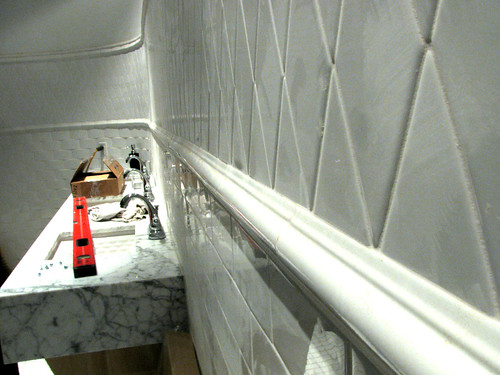
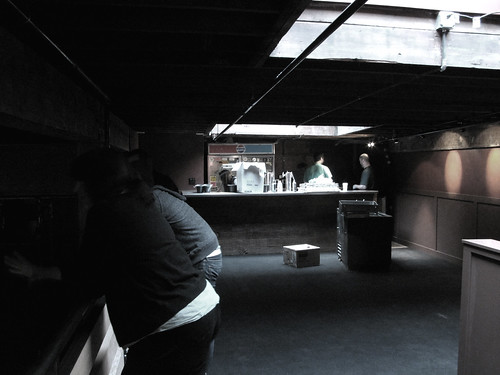
Check it out for yourself:
